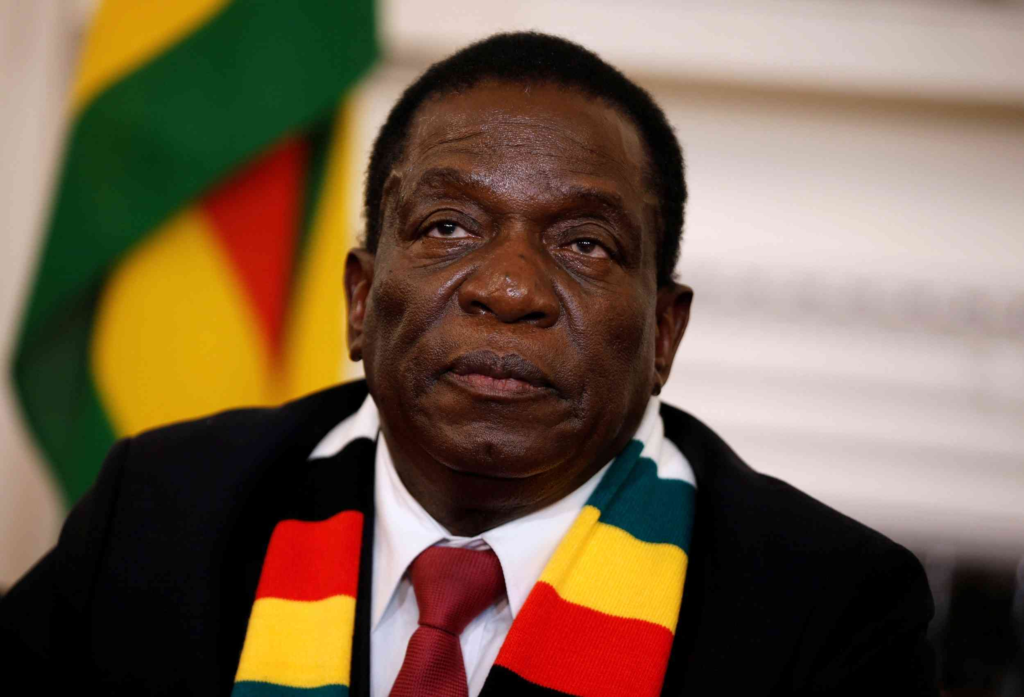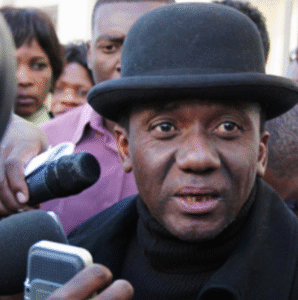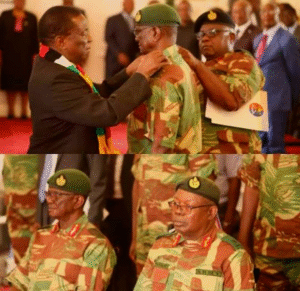MNANGAGWA’S MEN PUSH FOR THIRD TERM: Zimbabwe Political Tensions Escalate

Amidst vehement denials by Zimbabwean President Emmerson Mnangagwa regarding his intentions for a third term post-2028, his staunchest supporters continue to champion his extended stay in power, disregarding the constitutional constraints. As Mnangagwa’s second term nears its conclusion, a clash of political ambitions unveils, exposing deep rifts within the ruling party.
In a telling scene captured in Shurugwi, within Mnangagwa’s native Midlands province, political heavyweight Owen “Mudha” Ncube, who serves as the Midlands Provincial Affairs and Devolution Minister, led a fervent public chant, asserting that Mnangagwa would remain at the helm until 2030, well beyond the expiration of his second term. This bold proclamation was echoed alongside Mnangagwa’s twin son, Collins Takunda, intensifying the speculation about the president’s political future.
This public display of loyalty toward Mnangagwa starkly contrasts with the sentiments of another significant faction within the ruling party, led by Vice-President Constantino Chiwenga. With a military-backed following, Chiwenga’s faction staunchly opposes any notion of Mnangagwa’s tenure extension. They advocate for a strict adherence to the constitutional term limits, insisting that the current president should step down at, or even before, the end of his second term in 2028.
The political drama unfolding in Zimbabwe is not just about individual aspirations but is indicative of a broader power struggle within the ruling Zanu PF party. This tug-of-war is emblematic of the party’s historical internal conflicts, which have often led to dramatic shifts in its leadership dynamics. The insistence by Mnangagwa’s loyalists for him to stay in power contradicts his public statements and raises questions about the genuine democratic ethos within the party.
The implications of these conflicting stances are profound. On one hand, Mnangagwa’s extended rule could stabilize his faction’s hold on power, allowing continued implementation of his policies and agendas. On the other, it poses significant risks to the foundational democratic principles of the nation, potentially inciting political instability or unrest. Furthermore, the disregard for constitutional limits could set a precarious precedent for future leadership transitions in Zimbabwe.
Observers and political analysts are closely watching these developments. The active campaign by Mnangagwa’s allies suggests a planned maneuver to amend the constitution or to find other loopholes to enable his stay in office. Such a move would require significant political capital and could potentially alienate other key stakeholders in the Zimbabwean political landscape, including the military, which has historically played a crucial role in the nation’s governance.
Moreover, the public endorsement by figures like Ncube and the presence of Mnangagwa’s family members at political rallies complicates the narrative. It signals an emboldened faction that is not only prepared to support Mnangagwa’s continued presidency but is also actively preparing the groundwork for such an eventuality.
Vice-President Chiwenga’s opposition represents a critical counterbalance within this dynamic. His military-backed faction’s resistance to Mnangagwa’s extended presidency is a stark reminder of the fragile nature of political alliances and the ever-present danger of sudden shifts in power. The outcome of this internal party conflict could very well determine the future trajectory of Zimbabwe’s political landscape.
As Zimbabwe inches closer to 2028, the actions and strategies of Mnangagwa’s proponents and his detractors within the party will be pivotal. The nation stands at a political crossroads, with its democratic integrity and stability hanging in the balance. How this struggle resolves could either reinforce Zimbabwe’s commitment to democratic principles or plunge it back into the shadows of extended autocratic rule.



